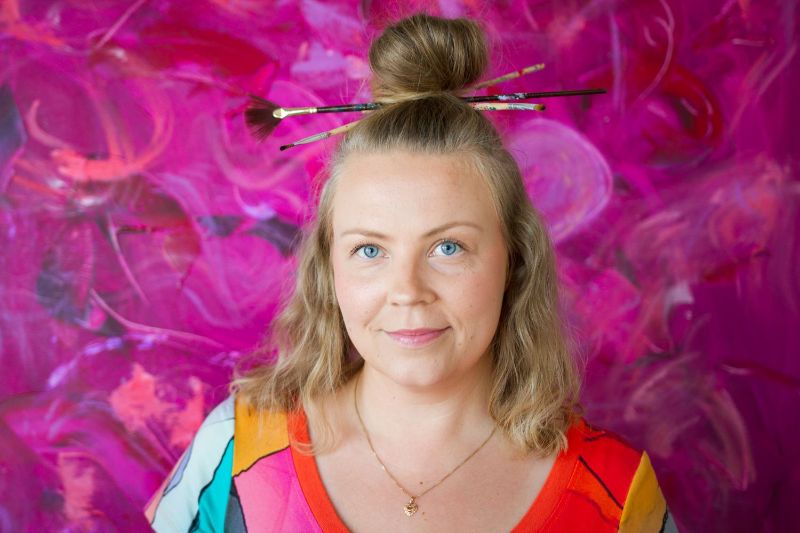Artist
"The best part is when I can offer people experiences of success in art and help them rediscover that perhaps lost creativity within themselves. I also love the freedom being self-employed, allowing me to set my own working hours and methods. Working intuitively with colour is inspiring and liberating!"

- Riika Nick
- An artist and organiser of art workshops in her own company, Riika Nick Art.
- Self-taught in art. She also holds a Bachelor of Social Services degree from Metropolia University of Applied Sciences and is qualified as a kindergarten teacher.
- Five years of work experience in the field.
Briefly explain what you do for a living.
I own my own art business. I paint colourful abstract acrylic paintings, create commissioned works and organise various low-threshold painting workshops for individuals and companies at my own art studio in Malmi, Helsinki and, if necessary, on my clients' premises.
How have you ended up in the profession of your choice?
I discovered my artistic side in January 2019. Until then, I didn’t think I was not artistically talented. However, doing some abstract and intuitive stuff immediately felt like me and carried me away. Friends started asking me first for private lessons for their children and then asked if I could organise a wine and painting evening for adults too. As somebody who thrives on spontaneity, I organised my first art workshop after having painted for only two months. Around the same time, I also produced my first commissioned work. I'm still on this path, just under five years and well over 200 independently organised workshops later. There's plenty of work to do and the paintings have sold well.
Describe your typical working day or week.
My days and weeks vary a lot. When I don't have a workshop, I work at home all day or I’m in my studio painting. On the days when I run a workshop in the evening, I often work from home while the children are at school. I then spend a few hours with them and go to the studio about two hours before the workshop starts to make all the necessary preparations. During the workshop itself, I focus entirely on my clients. After the workshop, I often spend up to two hours cleaning up and updating social media.
What kind of work environment or working hours do you have?
I work mainly in my own inspiring and colourful art studio in Helsinki where I paint and hold the workshops. However, on an almost daily basis I also do invoicing, messaging, marketing, social media, website maintenance and organising accounting materials. I try to do all the work I can on weekdays when the children are at school, but workshops are often on weekday evenings or at weekends. I usually hold two or three workshops during the week.
What kind of competence or qualities are required in the profession?
The job requires emotional intelligence and good interpersonal skills, which are particularly important in workshops and other client encounters. Self-management, organising your own work, anticipation and time management are all important skills for being an entrepreneur. It's also useful to be eager to learn new things and constantly develop your skills, both in the arts and in areas such as sales and marketing.
What is the best thing about your profession?
The best part is when I can offer people experiences of success in art and help them rediscover that perhaps lost creativity within themselves. I also love the freedom being self-employed, allowing me to set my own working hours and methods. Working intuitively with colour is inspiring and liberating!
What are the downsides of the profession or what seems challenging?
Working as a self-employed artist is very independent. In practice, you have to do everything yourself unless you can afford to outsource some aspects of the work to other people. Pricing and marketing art can sometimes seem challenging. Getting grants is very difficult, especially as a self-taught artist. There is also seasonal variation, which can be seen as a good or bad thing.
What would you tell a person considering the profession of a artist?
I think that both art graduates and self-taught artists can make it in the field. As an entrepreneur in the arts, you often have to play a wide range of roles. In addition to being an artist, you have to be a salesperson, marketer, social media expert, cleaner, stock-taker and secretary.
I think that one of the challenges of the job is that, in order to ensure a steady income, you need to have many different sources of income, for example selling paintings and prints, organising workshops and doing different collaborations. When you work alone, you just don't have enough time to do everything. So in a way, it might make sense to invest fully in one area but then the income is often much more uncertain.
How do you see the future of your profession?
I believe and hope that the enthusiasm for making things by hand will continue, even though artificial intelligence is taking over the world more and more. I believe that creative workshops will continue to be popular and that the paintings will sell, as people want experiences and original artworks in their homes.
Photo: Sari Ayre
